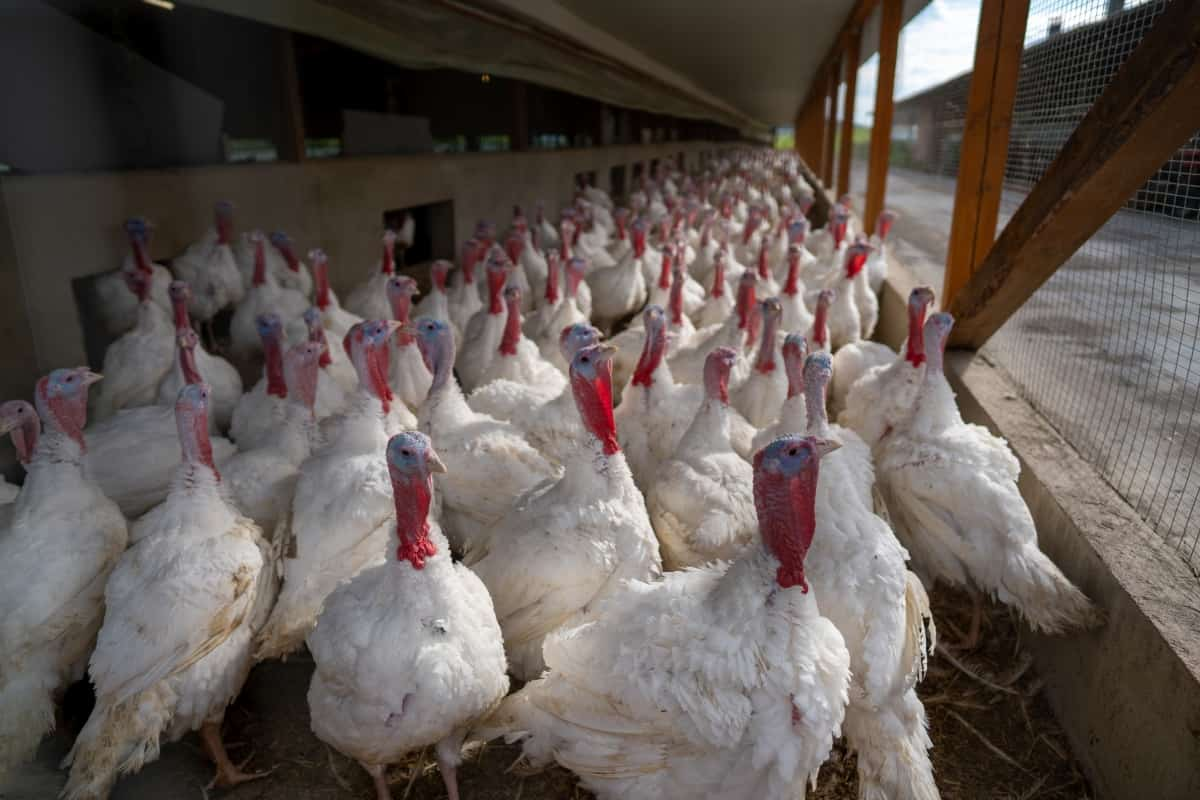Increasing turkey egg production is of utmost importance for farmers and poultry keepers. Boosting turkey egg production plays a vital role in maintaining genetic diversity within turkey populations. It allows farmers to select high-performing individuals as breeding stock and improve overall flock productivity over time.

How to Increase Turkey Egg Production
Optimizing Nutritional Intake
Providing a well-balanced and nutrient-rich diet plays a significant role in enhancing their egg-laying capacity. To optimize nutritional intake, it’s important to ensure that turkeys have access to high-quality feed specifically formulated for laying hens. This feed should contain essential nutrients such as protein, vitamins, and amino acids necessary for healthy egg development.
Additionally, supplementing their diet with ingredients like calcium can help strengthen the shells of the eggs they lay. Providing fresh water at all times is crucial for proper digestion and overall well-being. The most effective way to increase turkey egg production naturally is by providing a balanced and nutritious diet.
Implementing a Consistent Light Management Program
Turkeys, like many other birds, are highly influenced by light and darkness cycles. By managing their exposure to light effectively, you can stimulate their reproductive systems and encourage higher egg-laying rates. To achieve this, you can use artificial lighting in the turkey house. It’s also essential to provide uniform lighting throughout the entire turkey house. Regular maintenance and monitoring are necessary aspects of implementing a consistent light management program. Additionally, keep an eye on how well your turkeys respond to different lighting schedules and make adjustments accordingly.
Maintaining Ideal Housing Conditions
Temperature control: Maintaining the right temperature in the turkey house is essential. Extreme heat or cold can disrupt egg-laying patterns, so it’s important to provide proper ventilation and insulation.
Nesting areas: Creating suitable nesting areas encourages turkeys to lay their eggs in designated spots rather than hiding them elsewhere. This makes collection easier and helps prevent damage or loss of eggs.
Cleanliness: A clean environment is essential for healthy turkeys and optimal egg production. Regularly cleaning the turkey house, removing waste, and providing fresh bedding contribute significantly to maintaining hygiene.
Lighting management: Proper lighting plays a vital role in regulating turkey reproductive cycles. To maintain consistent egg production, it’s important to provide appropriate amounts of light during both natural daylight hours and artificial lighting periods.
In case you missed it: Beltsville Small White Turkey: Breed Characteristics, Origin, Size, Uses, Price, Breeding, and Lifespan

Understanding Turkey Breeding and Genetics
Breeding plays a vital role in increasing turkey egg production. Turkey farmers need to have a good understanding of these factors to optimize their breeding programs. Farmers should choose birds that have desirable traits such as high egg-laying capacity, good fertility, and strong immune systems.
Genetics plays a main role in determining the egg production potential of turkeys. In addition to selective breeding, artificial insemination techniques can be used to enhance turkey genetics further. This allows farmers to introduce new genes into their flocks and improve overall productivity.
Reducing Stress Factors
Stress can have a detrimental impact on turkey egg production. When turkeys are exposed to stressors, such as overcrowding, inadequate nutrition, or sudden changes in their environment, it can disrupt their reproductive cycle and decrease egg-laying capacity. Therefore, farmers must minimize stress factors within the flock. One way to reduce stress is by providing ample space for each turkey.
By ensuring that each turkey has enough room to move around comfortably, farmers can create a more harmonious environment that promotes higher egg production. Another important factor is maintaining consistent feeding schedules and providing a well-balanced diet. In addition to nutrition, maintaining ideal housing conditions is essential for minimizing stress levels in turkeys. Extreme temperatures can cause significant stress among the birds and impact their overall health and productivity.
Effective Health and Disease Management
Healthy birds are more likely to lay consistently and produce high-quality eggs, contributing to overall productivity on the farm. Regular veterinary check-ups and vaccinations play a vital role in preventing diseases that can impact turkey health and egg production. Early detection of signs of illness is crucial for timely intervention.
Regular monitoring allows farmers to identify potential health issues before they escalate into major problems affecting Turkey’s egg production. Keeping detailed records enables tracking patterns over time and aids in making informed decisions regarding flock management practices.
Supplements to Increase Egg Production
Supplements can enhance turkeys’ egg production. These additional nutrients can provide the necessary support to optimize their reproductive health and boost egg-laying capacity. When it comes to choosing supplements for turkeys, they’re important for their specific nutritional needs. One commonly used supplement is calcium, which is essential for the formation of strong and healthy eggshells.
By providing an adequate amount of calcium through supplements, you can help prevent issues like thin or fragile shells that may result in reduced hatchability rates. Omega-3 fatty acids are another beneficial supplement that can improve the turkey egg’s quality and quantity. Probiotics are also gaining popularity as a supplement for turkey production. A good diet that includes all essential vitamins and minerals will ensure the proper functioning of various physiological processes involved in reproduction.
Utilizing Proper Egg Collection Practices
It’s important to collect eggs frequently throughout the day. This prevents them from piling up and getting damaged by other birds or trampled upon. Regular collection also reduces the chances of eggs being soiled or becoming contaminated. Gentle handling is key when collecting turkey eggs.
Turkeys can be sensitive creatures, so using care while gathering their eggs helps minimize stress levels and potential damage to the fragile shells. Proper storage is another critical aspect of egg collection practices. Eggs should be stored at temperatures between 10-13°C with a humidity level of around 70%. This helps maintain their freshness and extends their shelf life for later use or sale.
Impact of Seasonality on Egg Production
During the winter months, when days are shorter, egg production tends to decrease. This is because turkeys require a certain amount of light each day to stimulate egg production. The increased exposure to natural light triggers their reproductive systems and encourages greater egg-laying activity. Turkey farmers need to understand these seasonal fluctuations to manage egg production effectively.
In case you missed it: Royal Palm Turkey: Breed Profile, Characteristics, Temperament, and Price

By providing supplemental lighting during the winter months, farmers can help maintain consistent levels of light that mimic longer daylight hours. This artificial lighting helps stimulate the turkeys’ reproductive system and promotes continued egg-laying. By closely monitoring environmental factors and implementing appropriate measures such as ventilation or heating systems when necessary, farmers can create comfortable conditions that support increased egg-laying capacity.
Continuous Monitoring and Record Keeping
By closely tracking your flock’s performance, you can find issues that may be affecting egg-laying capacity. Regularly monitoring key metrics such as feed consumption, water intake, and body weight can provide valuable insights into your turkeys’ overall health. The first sign that a turkey is about to lay eggs is an increase in nesting behavior.
Record keeping also enables you to track individual bird performance, identifying high-performing individuals or potential problem birds. By documenting laying patterns, fertility rates, and hatchability percentages, you can pinpoint areas for improvement in breeding practices or adjust management strategies accordingly.
In case you missed it: Slate Turkey: Breed Profile, Characteristics, Origin, Size, Uses, Price, Breeding, and Lifespan

Conclusion
Increasing egg production means a higher yield of eggs, which translates to more potential revenue. Turkey eggs can be sold for consumption or used in various food products. A larger supply of eggs allows for greater market availability and increased profitability. Moreover, a boost in egg production allows farmers to meet the growing demand for turkey products in the market.
- Feed Your Flock for Less: Top 10 Tips to Save on Chicken Feed
- Ultimate Guide to Ossabaw Island Hog: Breeding, Raising, Diet, and Care
- Hatching Answers: The Top 10 Reasons Your Chickens Aren’t Laying Eggs
- Eggs and Economics: Breaking Down the Cost of Raising Backyard Chickens
- Defend Your Greens: Proven Methods to Keep Iguanas Out of Your Garden
- Ultimate Guide to Cinnamon Queen Chicken: A Comprehensive Guide for Beginners
- Ultimate Guide to California Tan Chicken: Breeding, Raising, Diet, Egg-Production and Care
- Ultimate Guide to Marsh Daisy Chicken: Breeding, Raising, Diet, and Care
- 10 Types of Chicken Farming Businesses You Can Start for Profits